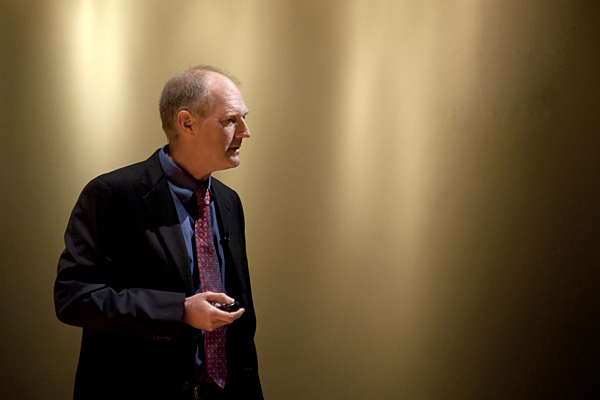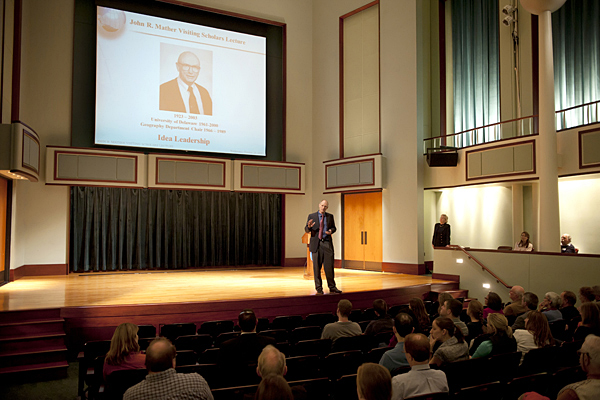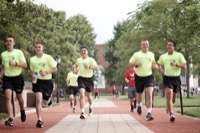Alum delivers Mather Lecture
Johannes Feddema shares research legacy of UD geography giant
1:56 p.m., Oct. 26, 2011--The late Prof. John “Russ” Mather was internationally known for his important contributions to water budget and applied climatology and to water resources analysis. But, according to Johannes Feddema, one of his former students, Mather had an even bigger impact as a teacher who encouraged independent thinking and sparked a hunger for knowledge in those lucky enough to take his classes.
On Thursday evening, Oct. 20, Feddema, who earned his doctorate at the University of Delaware in 1990, shared insights into Mather—the researcher, the professor, and the man—in a lecture at the Roselle Center for the Arts. The talk, “From the Water Budget to Global Climate Models: Understanding the Human Influence on Climate,” was the inaugural John R. Mather Visiting Scholars Lecture.
People Stories
'Resilience Engineering'
Reviresco June run
Now a professor in the University of Kansas Department of Geography, Feddema developed an interest in the impacts of climate on society during a childhood spent largely in Europe and Africa. But it was Mather who triggered Feddema’s academic interest in the subject and influenced his career direction.
As an undergraduate, Feddema came away from one of Mather’s classes with an understanding that the climatic water budget—which reflects relationships between water inputs and outputs throughout a region—is fundamental to any evaluation of what might happen as societies undertake small- and large-scale modifications of their environment.
“Russ enabled me to start thinking about how to combine information from multiple sources and bring it together in a way that made sense,” Feddema said. “All of a sudden, I could look at the world in a mechanistic way and ask, ‘what would happen if I do this or I do that?’”
Feddema brought that understanding to his creation of models and databases to assess human impacts on climate.
“Another thing I learned from Russ was that while models are valuable in simulating climate, they’re only as good as the data you put in,” Feddema said. “If you don’t do it right, you’re not going to get a good answer.”
To answer the question of how people affect climate, Feddema said we have to think about what a place would look like without us, and then it becomes obvious just how great an impact we have.
Human behaviors that affect climate include a wide range of activities from grazing and agriculture to urbanization and building practices. But even within any one of these categories, there are wide variations that need to be considered. For example, in agriculture, what crops are you growing? Are you using fertilizers? Are you irrigating?
Similarly, urbanization means different things in different places—roof and building materials, types of land cover, and heating and air conditioning practices vary widely between the business district of a modern city and a slum in a developing country.
“Climatic models are changing,” Feddema said, “and they’re now incorporating such concepts as deforestation, dynamic vegetation and urban systems.” He cited a trend away from global climate models, which focus on the physics of processes, and toward earth system models, which view the earth as a complex system.
“Again, this was a lesson I learned from Russ—that you have to think about the entire system and how it impacts the environment,” Feddema said. “You can’t just look at one or two factors in isolation; you have to look at all of them together and see how they interact.”
In closing, Feddema said that as he walked around campus before his talk, he noticed banners illustrating the pillars identified as key attributes in UD’s re-branding process. One in particular caught his eye, and he finished with a slide showing a photo of Mather captioned with “Idea Leadership.”
“Russ epitomized this concept,” Feddema said.
The audience was welcomed to the lecture by Nancy Targett, dean of the College of Earth, Ocean, and Environment; Tracy DeLiberty, chair of the Department of Geography; and Cort Willmott, professor and former department chair.
Mather’s work built on that of C.W. Thornthwaite, who developed the concept of the climatic water budget and a climate classification system. Mather collected data and conducted experimental work in support of Thornthwaite’s theories, and Willmott brought the research into the digital age with the development and implementation of computer models.
About the speaker
Johannes Feddema is a climate scientist investigating the interactions between human activities at Earth’s surface and climate. After earning degrees in biology, geography, and climatology from the University of Delaware, he began working to create models and databases to assess the impacts of anthropogenic land-cover change, urbanization, and soil degradation on climate. He is currently a professor of geography at the University of Kansas and an affiliate scientist with the National Center for Atmospheric Research.
About the series
The John R. Mather Visiting Scholars Lecture series was established by Sandra Mather to honor her late husband and enable the UD Department of Geography to host well-known scholars for the active exchange of ideas related to Mather’s broad interests in climatology and geography among faculty, students, friends, and alumni.
The next lecture will take place on May 3, 2012. The speaker will be Charles J. Vörösmarty, professor of civil engineering, distinguished scientist with the NOAA-Cooperative Remote Sensing Science and Technology Center, and director of the City University of New York’s Environmental Crossroads Initiative.
About John Mather
John R. Mather, professor emeritus of geography at UD and a world-renowned climatologist, died in 2003. He began his professional career as a research associate and climatologist at Johns Hopkins University, where he earned his doctorate in 1951. Mather joined the UD faculty in 1961 and chaired the Department of Geography from 1966-89. During his years at UD, Mather taught thousands of students. He authored several books on applied climatology and water resources and was U.S. editor on a joint U.S.-Soviet Union book on global change.
Mather served on committees for the American Geophysical Union, American Meteorological Society, National Academy of Sciences/National Research Council, and American Association of State Climatologists, among others. He was elected a fellow of the American Association for the Advancement of Science in 1989 and has received the Commander Award for public service given by the U.S. Department of the Army. The Association of American Geographers formally recognized his career with its Lifetime Achievement Award in 1998, and in 1999 he received the American Geographical Society’s Charles P. Daly Medal. At UD, he received an excellence in teaching award in 1989 and the Francis Alison Award in 1990. He served as Delaware’s state climatologist for many years.
Article by Diane Kukich
Photos by Shawn Kirkpatrick












